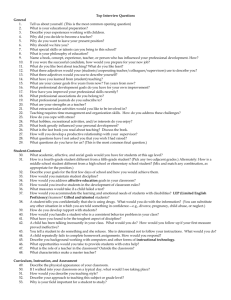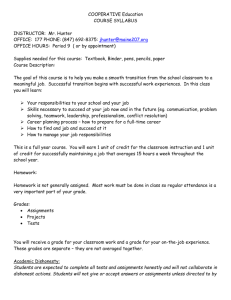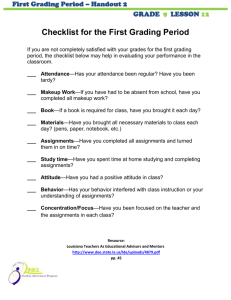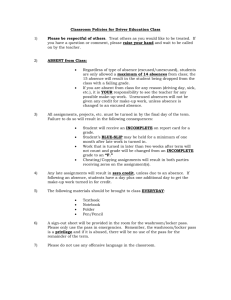Religions of the World, GREL 101, sect
advertisement
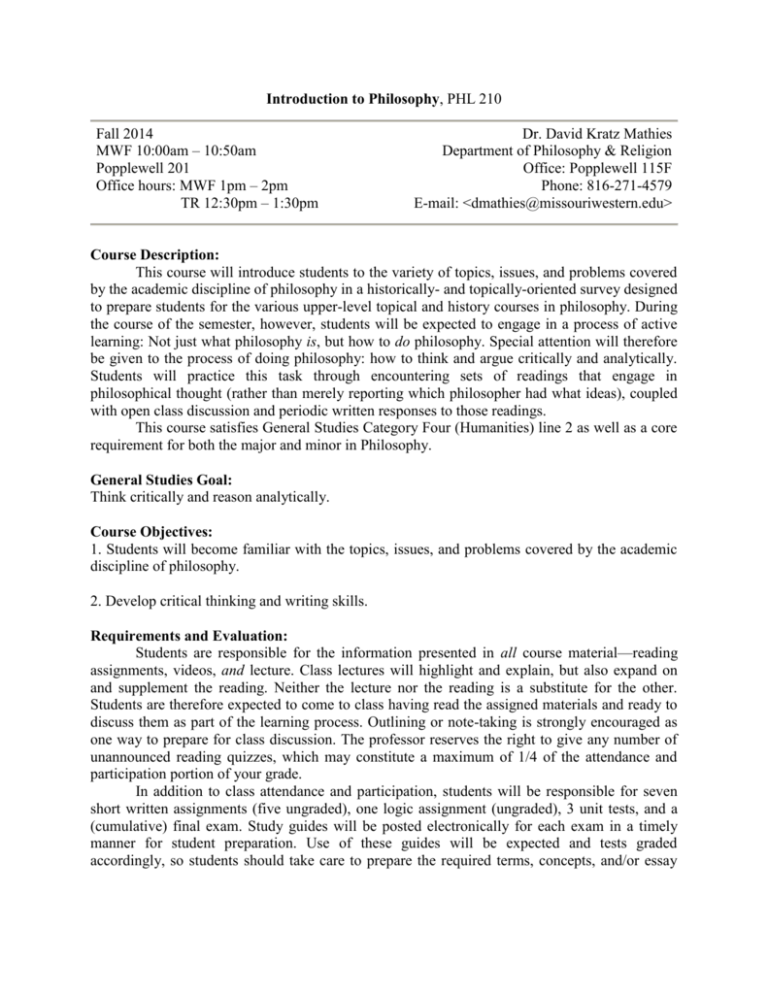
Introduction to Philosophy, PHL 210 Fall 2014 MWF 10:00am – 10:50am Popplewell 201 Office hours: MWF 1pm – 2pm TR 12:30pm – 1:30pm Dr. David Kratz Mathies Department of Philosophy & Religion Office: Popplewell 115F Phone: 816-271-4579 E-mail: <dmathies@missouriwestern.edu> Course Description: This course will introduce students to the variety of topics, issues, and problems covered by the academic discipline of philosophy in a historically- and topically-oriented survey designed to prepare students for the various upper-level topical and history courses in philosophy. During the course of the semester, however, students will be expected to engage in a process of active learning: Not just what philosophy is, but how to do philosophy. Special attention will therefore be given to the process of doing philosophy: how to think and argue critically and analytically. Students will practice this task through encountering sets of readings that engage in philosophical thought (rather than merely reporting which philosopher had what ideas), coupled with open class discussion and periodic written responses to those readings. This course satisfies General Studies Category Four (Humanities) line 2 as well as a core requirement for both the major and minor in Philosophy. General Studies Goal: Think critically and reason analytically. Course Objectives: 1. Students will become familiar with the topics, issues, and problems covered by the academic discipline of philosophy. 2. Develop critical thinking and writing skills. Requirements and Evaluation: Students are responsible for the information presented in all course material—reading assignments, videos, and lecture. Class lectures will highlight and explain, but also expand on and supplement the reading. Neither the lecture nor the reading is a substitute for the other. Students are therefore expected to come to class having read the assigned materials and ready to discuss them as part of the learning process. Outlining or note-taking is strongly encouraged as one way to prepare for class discussion. The professor reserves the right to give any number of unannounced reading quizzes, which may constitute a maximum of 1/4 of the attendance and participation portion of your grade. In addition to class attendance and participation, students will be responsible for seven short written assignments (five ungraded), one logic assignment (ungraded), 3 unit tests, and a (cumulative) final exam. Study guides will be posted electronically for each exam in a timely manner for student preparation. Use of these guides will be expected and tests graded accordingly, so students should take care to prepare the required terms, concepts, and/or essay questions in advance. All four exams will be approximately 50 minutes in length; the third unit exam will be given as the first half of the final examination period. Please be aware that grading is not simply an assessment of mistakes (what you got wrong), but involves as well the quality (and even the quantity) of the work done. For essays and papers, this may involve effectiveness of writing, evidence of thoughtful preparation as exemplified by both the quantity and quality of details or supporting examples (including research where relevant), and creativity—as well as demonstrated mastery of the relevant course material. (Unless otherwise specified, all written assignments must involve engagement with— and explicit reference to—the assigned reading materials; omission of this requirement will be graded accordingly.) Along these lines, a ‘B’ represents not merely work that has adequately completed the assignment or answered the essay question on a test, but work that is also above average in quality; an ‘A’ correspondingly represents work that is outstanding in comparison with the overall class. Apart from the signed statement on plagiarism, no paper submissions will be accepted for this course. Since the 8 short written assignments are intended to prepare students for the class periods where they are due, all assignments must be submitted to Moodle at least one half hour prior to the class. No late assignments will be accepted (except in the case of emergencies). Ungraded assignments will neither raise nor lower a student’s overall grade, provided they are completed and submitted on time; failure to complete or to submit an assignment on time will result in the loss of 5% of your final grade. Opportunities for Contributions to your Class Participation Grade: Every day in class presents opportunities for students to improve their grade by asking or answering questions and otherwise contributing to class discussion; occasional reading quizzes offer further opportunity to add to class participation grade. Here is a list of 3 additional opportunities: 1) View (and discuss with the professor) the film Agora (DVD 1166) within the first two weeks of class. 2) Attend any qualifying events announced by the instructor (notification usually both in class and via e-mail). 3) View and write a review for a film selected from a list of documentaries exploring contemporary ethical topics (list of films and fuller assignment description available when requested). Attendance Policy: Students are expected to attend class regularly and participate actively. For the purposes of grading, students are allowed three class absences (either ‘excused’ or ‘unexcused’), but beyond those three, every unexcused absence will result in a 1/3 letter reduction of your attendance and participation grade. Attendance will be taken at the beginning of every class. Students who arrive for class after attendance has been taken are responsible for coming to the instructor after class to make sure their presence is noted. Such students will be marked late (3 latenesses = 1 absence). Except in the case of emergencies, requests for excused absences must be made in writing, in advance, and specifying each date to be excused, with appropriate documentation. Please note as well that attendance is a minimal requirement for the attendance and participation grade. Students are invited to ask questions or add appropriate comments at any time and active participation in class discussion is strongly encouraged: Perfect attendance without ever (or only seldom) speaking in class will receive a grade of ‘C’ for the attendance and participation component of the final grade. Students with 12 or more unexcused absences will automatically fail the course, regardless of coursework quality. Departmental Make-up Exam Policy: Students who, under exceptional circumstances, are granted permission to make-up exams must do so during time-periods designated by the Department of Philosophy & Religion. One make-up period will be scheduled during the last full week of classes prior to the date when mid-term grades are due; a second make-up date will be scheduled during the last full week of classes. The professor is, however, under no obligation to allow a ‘make-up’ if a student cannot provide written documentation demonstrating why they could not attend class. If a student misses the final exam, he or she will receive a ‘0’ for that exam or a course grade of ‘Incomplete’ (I), at the discretion of the professor. No exceptions may be made to this policy without the approval of the chairperson of the department. Academic Dishonesty: Please note that there is no assignment for which it is acceptable to submit someone else’s words as your own work! All assignments must be completed in your own words, with direct quotations clearly marked (either quotation marks or offset/indentation for longer quotes) and proper credit given for any use of sources (parentheticals, footnotes, or endnotes). Taking a substantial portion of a source—anything longer than a phrase—and substituting a word here or there is not paraphrasing. If you need to rely that much on a text, make sure you quote it and mark it. Also make sure that every time you make use of someone else’s ideas or information, even if you do not directly quote from the text, you cite your source with appropriate academic referencing (e.g. MLA, APA, or Chicago style). If you are not sure, please consult an appropriate style guide or the professor—please note, however, that page numbers in citations are obligatory (where relevant and provided in the source material) rather than optional, regardless of style guide specifications. Any assignment submitted that involves direct quotation without proper identification (as explained above) will receive a zero (rather than an ‘F’). At the discretion of the professor, such fraudulent assignments may be documented and submitted to the Provost’s Office for further action, according to university policy. For specific details of the university’s Academic Honesty Policy and for information on the student due process procedure, please see Western’s Student Handbook, available online at <http://www.missouriwestern.edu/handbook/index.pdf>. All students will be required to print out, sign, and submit a statement of understanding concerning this policy in connection with specific assignments for the course. Please see the appropriate form at the bottom of this syllabus. Students with Disabilities: Students seeking accommodations must first provide documentation of needed accommodations to the Accessibility Resource Center (ARC) located in Eder Hall, Suite 203. Once accommodations have been approved by the ARC, students are responsible for notifying their instructors of those accommodations. This should be done within the first two weeks of classes. Accommodations are not retroactive. Other Important University Policies: Students should refer to the university Student Handbook for details on the policy for the grade appeal process and the guidelines for classroom behaviour, both available at <http://www.missouriwestern.edu/handbook/index.pdf>. Requirements and Final Grade Calculation: Attendance and active class participation 20% 8 short written assignments (8 @ 5% each) 40% 3 unit tests (3 @ 10% each) 30% Final examination (comprehensive) 10% Books and Materials: Required Text: Soccio, Douglas. Philosophy in Context: A Historical Introduction, Wadsworth, 2005. ISBN: 9780495004707. Recommended Text: Gaarder, Jostein. Sophie’s World: A Novel about the History of Philosophy, Farrar, Straus and Giroux, Reprint ed., 2007. ISBN: 9780374530716. For the schedule of class readings, assignment deadlines, and test dates, please consult the course assignment schedule posted in Moodle. Please read, sign, and submit the form found on the following page at least one class prior to submission of the first written assignment. Statement of Understanding Regarding Plagiarism in Assignments _____________________________ (Name) I have read the syllabus for the course and I understand that all course assignments (both class presentations and papers) must be in my own words or with quotations clearly marked. I understand that these are NOT examples of my own words: rearranging whole phrases so that they appear in different order in the sentences and paragraphs of my source taking source sentences and replacing some of the words with synonyms. I understand that my options for making use of sources are: restating the ideas in my own words—the way I would explain it to someone else, using words and phrases that I would use—and then marking it with a reference citation using the direct quote (clearly marked with either quotation marks or indentation for a longer block quote) and then marking it with a reference citation. I understand it is my responsibility to clearly mark quotes and submit all other work in my own words—with both ideas and quotes clearly cited with appropriate references—and that failure to do this will result in my work receiving a grade of 0. _____________________________ (Signed) (Date)


